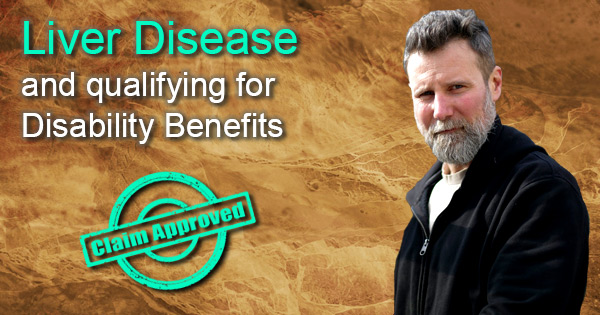Liver Disease / Cirrhosis and Qualifying for Disability Benefits
Can I get disability benefits if I am suffering from the effects of a Chronic Liver Disease such as Cirrhosis?
Author: Attorney Lonnie Roach
Updated: 1/19/2024
Approximately 100 million people in the United States suffer from some form of liver disease. Chronic liver disease (CLD) is a category of diseases that includes medical conditions such as cirrhosis, hepatitis, alcoholic liver disease, liver failure, and liver cancer. CLD can be inherited or caused by viruses, environmental toxins, alcohol and drug abuse, or autoimmune disorders. If left untreated, chronic liver disease can be debilitating and become life threatening. If you are suffering from the effects of Liver Disease you may qualify for disability benefits.

If you are suffering from the effects of Cirrhosis and have been denied disability don’t give up, almost 70% are denied initially! Just call 512-454-4000 for a free, no obligation consultation to learn what your options are.
Symptoms and signs of liver disease vary from person to person and commonly include:
- Jaundice
- Abdominal pain and swelling
- Extreme fatigue
- Nausea, vomiting, loss of appetite
- Enlargement of liver or spleen
- Swelling in ankles and legs
- Mental disorientation
- Dark urine, blood in stool
- Bruising easily
- Itchy skin
These symptoms can cause you to miss work and jeopardize your ability to maintain employment.
Can I qualify for Social Security Disability if I have cirrhosis or chronic liver disease?
Cirrhosis or chronic liver disease can impact a person’s ability to perform their job, but an applicant’s liver disease must be severe in order to qualify for Social Security Disability benefits.
Social Security has created a manual called the Blue Book which lists impairments Social Security considers disabling and may automatically qualify for benefits. Chronic liver disease is recognized as an impairment under Section 5.05.
Some diseases which may qualify under this listing include:
- Cirrhosis
- Hepatitis B or C
- Autoimmune hepatitis
- Liver failure
- Alcoholic liver disease
- Liver cancer
- Hepatoma (most common type of primary liver cancer)
One way to qualify for SSDI would be to match the requirements of this listing; unfortunately, the requirements are quite complex.
In addition to having a diagnosis of end stage liver disease or chronic liver disease lasting at least six months, you must have medical documentation of at least one of the following:
- Blood loss from a rupture in the digestive system requiring a blood transfusion;
- Fluid buildup in the abdomen;
- Fluid buildup around the lungs
- Spontaneous bacterial peritonitis – an infection characterized by a buildup of white blood cells around the abdomen;
- Hepatorenal syndrome – a kidney disorder that occurs in people with liver damage;
- Hepatic encephalopathy – temporary accumulation of toxins in the brain resulting from liver damage;
- End stage liver disease with CLD scores of 20 or greater. This is a calculation Social Security performs based on the levels of bilirubin and creatinine—two chemical compounds that are the natural byproducts of liver functioning—in your system and multiplies it by numbers that reflect the normal amount of these compounds in the body.
The criteria of this listing are both technical and complicated.
If you have doubts about whether you’ve had one of the above complications, ask your doctor to look at the listing with you. In order to prove that your condition is severe enough to prevent you from working you will need to provide documented medical evidence of the symptoms mentioned above. Your complete medical records should include:
- A diagnosis of liver disease by your doctor;
- A full liver panel to show how the liver is working;
- Imaging tests such as x-rays, MRIs, sonograph, and CAT scans;
- Results of liver biopsy;
- Records of blood transfusions;
- Surgery reports and hospitalization records;
- Medications you take;
- Treatments that have been attempted and your response;
- Notes from your physician and medical providers detailing your symptoms and how they impact your daily life as well as your response to treatment.
Be sure you are carefully following your doctor’s treatment plan.
For example, if your doctor has advised you not to drink alcohol and you continue to do so, Social Security may not approve your claim.
Liver transplants are listed separately under Section 5.09, in the Blue Book.
If you have had a liver transplant for any reason, you will be approved automatically for disability benefits for one year from the date of the transplant; after one year, your case will be re-evaluated.
If your symptoms don’t meet the criteria of Section 5.05, you may still qualify for Social Security Disability benefits if you can show that your functional limitations are so severe they prevent you from working at your job or any job.
Chronic liver disease can cause pain that keeps you from walking, lifting or carrying objects. You may have difficulty focusing or remembering instructions or you may need frequent rest breaks. Social Security will conduct a Residual Functional Capacity (RFC) assessment to evaluate your physical and mental capabilities to determine if there is any job you can do, taking into consideration your age, education and whether or not you can drive. If Social Security determines you cannot do your old job or don’t have the skills to perform a new job, you may be approved for a Medical-Vocational Allowance. Your doctor can help you by filling out an RFC form, being specific about your limitations and how they impact your daily life, and documenting your medications and treatments. Note that Social Security gives more weight to the records and opinions provided by specialists, so work with a gastroenterologist or hepatologist when gathering your medical evidence. Once Social Security determines the limitations caused by your condition, they will employ a vocational expert to assess whether a person with these limitations is employable.
If you are 55 or older or have another medical condition you may get approval.
Social Security follows a set of rules to determine when the agency expects an applicant to learn a new job.
Applicants who are 55 or older often fall under a grid rule, which means they are not expected to learn a new job. For example, a 55-year-old applicant with no transferable skills might be found disabled. If you can’t go back to your old job, and you don’t have the skills to learn a new one, Social Security will likely grant you disability benefits.
You may also be eligible for Social Security Disability benefits if you have another medical condition; for example, diabetes or high blood pressure.
One disorder by itself may not match the requirements of an impairment as stated in Social Security’s Blue Book, but if you have more than one medical condition, Social Security must consider how those health issues combined limit your ability to hold a job and perform necessary daily tasks.
Social Security also has basic financial requirements.
Before you are eligible for Social Security disability benefits, you must satisfy some basic financial requirements.
You must: 1) have a disability that has lasted or is expected to last 12 months; and 2) you must have worked in a job where you paid Social Security taxes long enough and recently enough; and 3) you must not earn more than Substantial Gainful Activity (SGA), which is $1,550 per month in 2024 for nonblind applicants and $2,590 per month for blind applicants.
What if I don’t qualify for SSDI?
If you haven’t worked long enough to earn enough work credits, or if you earn too much income, you may be eligible for disability benefits through another Social Security program, such as Supplemental Security Income (SSI), or from a long-term disability insurance plan through your employer or a privately purchased policy.
SSI is a program that pays monthly benefits to people with limited income and resources who are disabled, blind, or age 65 or older. SSI is based on income instead of work credits, and is financed by general funds of the U.S. Treasury.
I have long-term disability insurance – should I file a claim?
Yes, you should file a claim as soon as you become disabled.
Long-term disability insurance (LTD) is coverage that protects your income if you are unable to work due to illness or injury and is purchased as part of a group employment plan or privately through an insurance company. Policies pay between 50-60% of your salary and benefits continue until you return to work or for the number of years stated in the policy. However, LTD coverage is good only as long as you are employed, so do not quit your job before you file a claim, and be sure to check your policy’s definition of “disabled” as each policy will state the definition of “disabled” which is in use. Additionally, be aware that long-term disability insurance companies can require a claimant to also apply for SSDI.
How do I file for Social Security Disability benefits?
You can apply for Social Security Disability benefits online, over the phone, or in person at your local Social Security Administration office.
If your initial application is denied, don’t be discouraged. Approximately 65% of initial applications are denied, but you will have the opportunity to appeal.
There are four steps to the Social Security appeal process:
- File a Request for Reconsideration with the Social Security Administration to completely review the case.
- If you don’t agree with SSA’s response to your Request for Reconsideration, you can request a hearing before an Administrative Law Judge (ALJ). ALJs are attorneys who work for the Social Security Administration; they review SSDI cases and either uphold or overturn decisions to deny SSDI benefits. If you are not represented by an attorney at this point, now is the time to obtain legal counsel. This is a critical point in the process and will raise your chance for success.
- If an ALJ does not grant your claim, you can request that the Appeals Council review your case.
- Federal Court review. The final step in the appeal process is filing suit in U.S. District Court.
Do I need a disability attorney for SSDI?
Qualifying for Social Security Disability benefits if you have cirrhosis or another chronic liver disease is problematic because the requirements of Social Security’s impairment listing are very difficult to decipher.
Your chances for approval are increased significantly if you have an experienced disability attorney who can gather your necessary medical evidence and even write a brief explaining why you qualify. At each potential stage of the process, from the initial application stage, the reconsideration stage and the ALJ hearing stage, an attorney can assist you in completing the detailed forms and questionnaires required by Social Security, collecting and submitting relevant medical evidence, and preparing questionnaires for your doctors. At the ALJ hearing phase an attorney will not only continue to assure that the evidence is complete, but prepare you for questioning by the ALJ, prepare an argument on your behalf and question any doctors or vocational experts selected by the ALJ to testify at the hearing. At the Appeals Council and federal court level, a lawyer can present legal arguments to show your case was wrongfully denied. Fees charged by disability attorneys are regulated by federal law and are usually 25% of disability backpay you are owed. There are no out-of-pocket costs, and if you don’t win your case, you won’t be charged anything.
Do I need a disability attorney for a long-term disability insurance claim?
Whether you have a long-term disability insurance policy purchased through a private insurance broker or a group policy purchased with your employer, filing a claim for long-term insurance is a complex process.
The wording of LTD policies can be confusing and the laws and regulations which affect the two types of LTD insurance differ in their procedures for filing claims and appeals. An experienced LTD attorney with thorough knowledge of ERISA laws and regulations will avoid mistakes and increase your chance of success. An attorney will act on your behalf, completing your application and filing your claim in a timely manner. They can also negotiate a settlement or file an appeal for you. If it becomes necessary to file suit, an LTD attorney can prepare your case against an insurer. Most LTD attorneys handle cases on a contingency basis and charge approximately 25%-40% of a claimant’s past due benefits. You do not pay an attorney’s fee unless the attorney wins your case.
If you have chronic liver disease and it has prevented you from working, you may be eligible for Social Security Disability benefits, but Social Security’s criteria for determining disability with liver disease can be complex.
The attorneys at Bemis, Roach & Reed have wide experience in representing clients at all levels of the Social Security Disability process and in long-term disability insurance cases.
At The Texas Disability law firm Bemis Roach & Reed, our attorneys are committed to helping injured or disabled clients receive the benefits they deserve. Mr. Roach is AV Preeminent and SuperLawyers rated and has become a recognized leader in the field of Long Term Disability law. Mr Bemis focuses his practice on Social Security disability while Mr Reed handles both LTD and SSDI claims. Both are AV Preeminent and SuperLawyers rated and all our attorneys have been successfully helping people fight for their rights against big insurance companies and the government since 1993. If you have applied for benefits and been denied call 512-454-4000 for a free consultation and get help NOW.
Can you get Disability for Liver Cancer? – Help from a Long Term Disability Lawyer
Texas Social Security Disability Benefits and Hepatitis C
Alcohol Dependence and Qualifying for Disability Benefits

Your Free Initial Consultation
At Bemis, Roach and Reed, if we can't help you, we will try to find the right attorneys for you.
We offer each of our prospective clients a free no obligation one hour phone or office consultation to see if we can help you and if you are comfortable with us. We know how difficult a time like this can be and how hard the decisions are. If we can be of assistance to you and help you find a solution to your issue we will even if that means referring you to another attorney.
Or simply call
512-454-4000
to schedule your
Free Consultation
Let's get you Started:
If you could provide us with some basic information about your claim we will get right back with you with a free case evaluation and schedule your Free Consultation Today.









